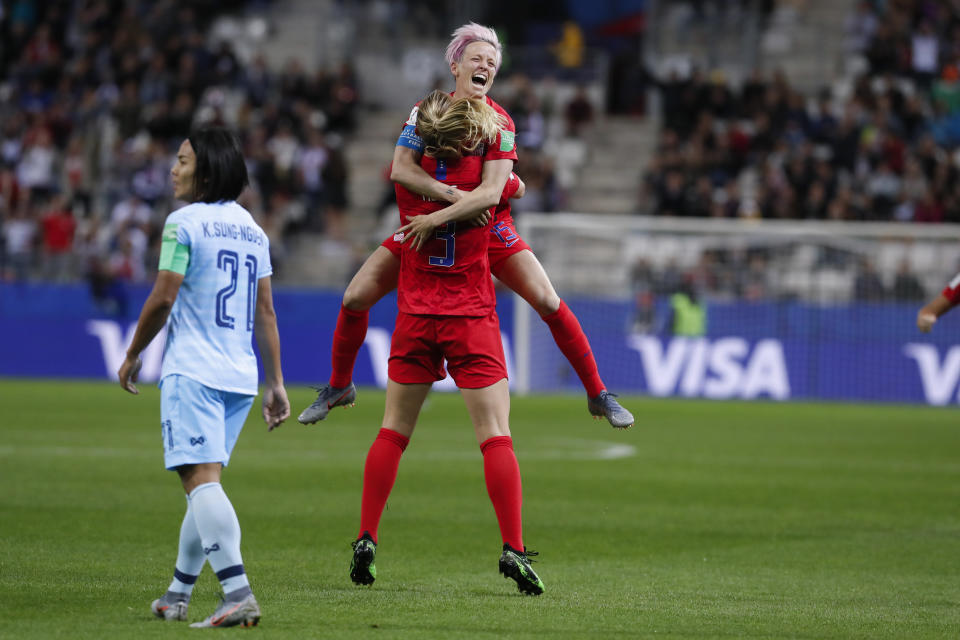Blame FIFA if you didn't like USWNT's 13-0 rout of Thailand
It’s not the fault of Alex Morgan, scorer of five goals, that Thailand was plainly unprepared to face the United States women’s national team in their Women’s World Cup opener on Tuesday.
It’s not the fault of Rose Lavelle, scorer of two goals, that Thailand had lost 11 of its 12 games heading into this tournament, including to five opponents who didn’t even qualify for this World Cup.
It’s not the fault of Samantha Mewis, scorer of two goals, that Thai goalkeeper Sukanya Chor-Charoenying quite obviously had no business in a tournament of this caliber, much like the defense in front of her.
It’s not the fault of Carli Lloyd, Lindsey Horan, Megan Rapinoe or Mallory Pugh — all of whom scored a goal apiece as well — that their opponents had only existed as a program for 20 years, and that it was appearing in only its fourth World Cup game, suffering its third loss and third shutout.
It's not the U.S. national team’s fault that it crushed Thailand 13-0.
It’s not U.S. Soccer’s fault that it plainly invests a great deal more in its women’s program than its Thai counterpart does. It might, for that part, not even be the Football Association of Thailand’s fault. After all, its women’s team is ranked 34th in the world by FIFA, whereas the men are 114th. And that really isn’t such a bad performance, considering Thailand’s per-capita GDP is a mere $7,600, a fraction of that of the mostly very wealthy countries in this tournament.
It is, more plausibly, FIFA’s fault.

If somebody must be blamed for what was, to many, a kind of sporting debacle – which neglects to recognize the investment and dedication it took over the course of decades to push the U.S. women’s program to the point where they could dominate anybody like this, is just as much worthy of praise and admiration – it’s probably the sport’s global governing body.
Before he was finally pushed out, long-time FIFA president Sepp Blatter looked to pat himself on the back for making the Women’s World Cup happen and growing it into an ever-larger event. And FIFA continues to blow its own horn about the emergence of the women’s game and occasionally makes grandiose gestures, like doubling the prize money for the Women’s World Cup from 2015 to 2019, never mind that, at $30 million, it’s still a pittance compared to the men’s $791 million pot in 2018.
FIFA gets it all wrong.
It doesn’t deserve nearly as much credit for the Women’s World Cup as it’s due heavy criticism for not doing more for the women’s game. And for not doing it sooner.
In its latest financial disclosures, FIFA showed some $2.7 billion in cash reserves. There is no convincing or compelling logic for FIFA to be sitting on that much money. Or for really any institution that isn’t the government to have that kind of bank statement, although that’s a separate matter. But it’s an especially foul state of affairs when women’s soccer is as badly underfunded as it is in so many places.
There are an awful lot of domestic federations that give women’s soccer short shrift. Almost all of them do, in some form. Even the American women, the foremost team in the world and vastly superior to the U.S. men, within the context of their respective games, are still fighting in court for equal pay.

FIFA has the power to change that. FIFA has the money to change that.
It can compel its member nations to take the women’s programs as seriously as the men’s. It can make up for the lack of funding. It can do any number of things.
Instead, FIFA just talks a big game about growing the sport and investing in the grassroots. And FIFA likes to expand these showpiece tournaments. It argues, not unreasonably, that having more teams will make the newcomers better, expand the sport to new places, give more teams a chance. Let’s be honest: more teams also gives FIFA more games to sell sponsorship and broadcast rights against. But its argument remains true in a sporting sense.
But being at the World Cup only benefits Thailand if it has the resources to take lessons from humiliations like Tuesday’s and act on them. If it can parlay this experience into growth, into best practices at the youth development level and an institutional knowhow for competing at these tournaments, this might turn out to be a turning point.
Yet the small Thai federation won’t have the means to do that. And FIFA has no history of providing the necessary assets to developing women’s programs that they badly need. It would rather sit on its money and focus on the men’s game. It would rather expand the World Cup, making room for countries like Thailand, and then hang them out to dry, taking lopsided losses.
And the U.S. women are not at fault for any of that.
Leander Schaerlaeckens is a Yahoo Sports soccer columnist and a sports communication lecturer at Marist College. Follow him on Twitter @LeanderAlphabet.
More from Yahoo Sports:
Warriors stars trash ‘classless’ Toronto fans after KD’s injury
Winslow II found guilty of rape, indecent exposure, lewd conduct


